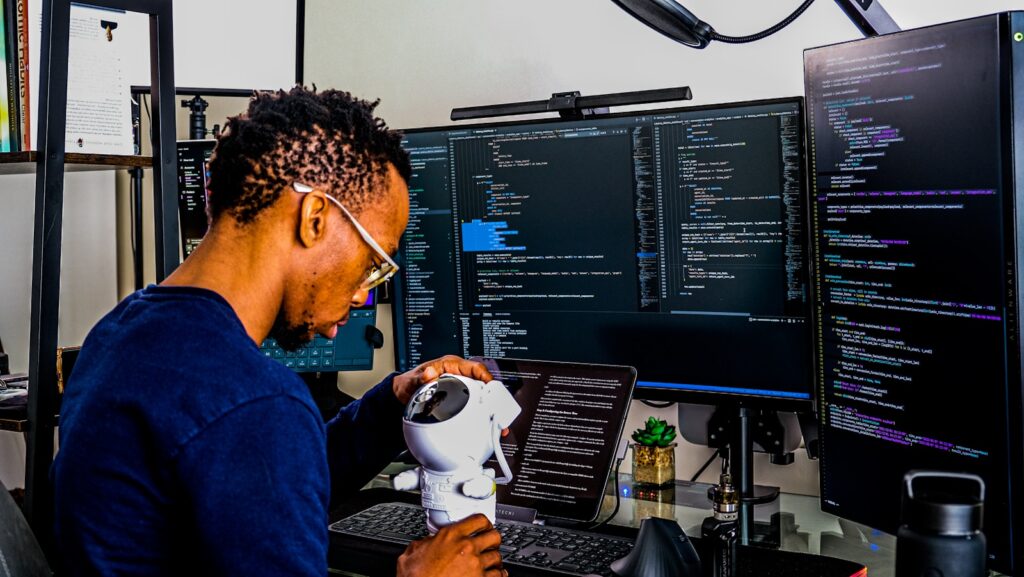
In today’s rapidly evolving global economy, acquiring high-demand skills is paramount for career advancement and securing lucrative opportunities, particularly within the burgeoning technology sector. The traditional barriers to elite education — cost, location, and rigid schedules — have significantly diminished thanks to the pioneering efforts of institutions like MIT and Harvard. These world-renowned universities have opened their digital doors, offering a wealth of free online courses that promise to equip ambitious individuals with the knowledge and capabilities to thrive.
This accessibility isn’t just a theoretical promise; it’s a proven pathway to success, as exemplified by individuals like Andrea Henshall. A retired major in the U.S. Air Force and current MIT PhD student, Henshall’s remarkable journey from combat tours and aerial circus performance to multiple aeronautics degrees at MIT underscores the transformative power of open educational resources. She attributes much of her academic triumph to MIT’s open source learning, specifically MIT OpenCourseWare (OCW) and MITx courses, which provided the high-quality, flexible learning environment she needed to excel.
Henshall’s experience is a testament to the fact that continuous learning, especially through structured, expert-led online programs, can dramatically alter one’s career trajectory. Whether you’re looking to pivot into a tech-centric role, enhance your existing expertise, or gain a competitive edge with a deeper understanding of the technological landscape and its societal implications, the following courses offer an unparalleled opportunity. We delve into some of the most impactful offerings that can truly empower you to cultivate the skills necessary for a high-paying career in technology and beyond.
1. **Machine Learning with Python: from Linear Models to Deep Learning**This course offers a comprehensive and in-depth introduction to one of the most in-demand fields in technology today: machine learning. For anyone looking to enter or advance within data science, artificial intelligence, or software engineering roles, a solid understanding of machine learning principles is non-negotiable. The curriculum is meticulously designed to cover a broad spectrum of topics, from the foundational linear models that underpin many algorithms to the complexities of deep learning, a subfield that powers much of modern AI.
Learners will also explore reinforcement learning, a critical area for developing autonomous systems and intelligent agents, which is gaining significant traction in robotics, gaming, and various industrial applications. The practical orientation of this course is a major strength, ensuring that participants don’t just grasp theoretical concepts but also gain hands-on experience. Through engaging Python projects, students will learn to implement and apply machine learning algorithms, translating theoretical knowledge into actionable skills.
Furthermore, this course holds particular significance as it represents the final course in the MITx MicroMasters program in Statistics and Data Science. This integration means that successfully completing this course not only provides standalone expertise but also contributes to a recognized credential that can significantly bolster one’s professional profile. The practical, project-based approach, combined with its advanced subject matter, makes it an indispensable asset for anyone targeting high-paying positions requiring sophisticated analytical and programming capabilities.

2. **Introduction to Computer Science and Programming Using Python**For those embarking on a journey into the world of technology, or even seasoned professionals seeking to solidify their foundational programming skills, this introductory course is an ideal starting point. It provides a robust and accessible entry into computer science, focusing on breadth of understanding rather than extreme depth in any single niche. This approach ensures that learners develop a well-rounded appreciation for various aspects of computing, a crucial foundation for any tech career.
The course introduces Python, a versatile and widely used programming language that is a staple in fields ranging from web development to data science and artificial intelligence. Students will gain proficiency in Python, which is often cited as one of the most beginner-friendly yet powerful languages. Beyond syntax, the curriculum delves into fundamental concepts such as simple algorithms, providing learners with the ability to design logical problem-solving steps that are the bedrock of all software.
Crucially, the course also covers essential practices like testing and debugging, skills that are vital for writing reliable and maintainable code—a hallmark of any competent programmer. An introduction to data structures helps students understand how information is organized and manipulated efficiently, while an informal primer on algorithm complexity offers insights into how to evaluate the performance of different computational solutions. These core competencies are indispensable for a wide array of high-paying tech roles, from entry-level software development to more advanced engineering positions.
3. **The Iterative Innovation Process**Innovation is the lifeblood of the tech industry, driving disruption, creating new markets, and sustaining growth. This course provides a structured and actionable framework for understanding and implementing the iterative innovation process, a methodology critical for individuals and organizations alike. In a fast-paced environment where market demands and technological capabilities constantly shift, knowing how to continuously refine and adapt ideas is key to success.
Participants will learn about the interconnectedness of markets, implementation strategies, and underlying technology—three pillars essential for successful innovation. This holistic view helps professionals identify opportunities not just within technological advancements, but also in market needs and efficient execution, which are crucial for bringing groundbreaking ideas to fruition. Understanding these dynamics is particularly valuable for product managers, entrepreneurs, and R&D professionals in tech.
Throughout the course, students are challenged to build their own innovation process model, leveraging real-world examples and practical exercises. This hands-on approach ensures that the theoretical knowledge translates into tangible skills, enabling learners to drive innovation within their teams or launch their own ventures. Developing an innovation mindset and mastering these processes can lead to high-impact roles focused on strategic growth and competitive advantage in any technology-driven enterprise.
Read more about: The Gears of Genius: 11 Studio Projects That Truly Redefined Automotive Expectations

4. **Supply Chain Analytics**The optimization of supply chains has become a critical competitive differentiator across industries, and technology plays an increasingly central role. This hands-on business and management course focuses on the practical application of core supply chain analytics methodologies and modeling. It’s designed for professionals who need to leverage data to make informed decisions that improve efficiency, reduce costs, and enhance resilience within complex supply networks.
The curriculum emphasizes statistical methods, regression analysis, optimization techniques, and probability — all essential tools for any data-driven role. Unlike purely theoretical courses, the focus here is on the ‘how’ and ‘where’ specific tools can be effectively deployed to tackle real-world supply chain challenges. This practical orientation ensures that learners acquire skills that are immediately applicable in a professional setting, making them valuable assets in roles that demand both analytical rigor and business acumen.
This course is also integrated into the MITx Supply Chain Management MicroMasters Credential, signifying its foundational importance within a broader, recognized pathway for career development in supply chain management. For tech professionals involved in logistics, operations, e-commerce, or manufacturing, mastering supply chain analytics provides a powerful toolkit for designing, managing, and optimizing the sophisticated networks that underpin global commerce, leading to roles with significant strategic impact and earning potential.
Read more about: 7 Game-Changing Careers AI Will Create by 2030: Your Blueprint for Future-Proofing Your Professional Journey

5. **Supply Chain Fundamentals**Building upon or preceding advanced analytics, this course lays the groundwork for foundational skills in supply chain management and logistics. In an era where global supply chains are increasingly complex and frequently challenged, a deep understanding of their fundamentals is essential for any professional whose work intersects with product delivery, resource allocation, or operational efficiency. This is particularly relevant for tech companies dealing with hardware, cloud infrastructure, or global service delivery.
Students will learn to develop and apply analytical tools, approaches, and techniques specifically tailored for supply chain contexts. The emphasis is placed on understanding *when* and *how* to use these specific tools to improve a supply chain’s overall performance or reduce its total cost. This critical thinking about tool application is what transforms theoretical knowledge into practical, value-generating capability, highly sought after in modern businesses.
As another integral part of the MITx Supply Chain Management MicroMasters Credential, this course serves as an excellent entry point for individuals aspiring to roles in operations, logistics, procurement, or business analysis within the tech sector. The skills acquired – from understanding demand forecasting to inventory management and transportation logistics – are crucial for optimizing tech product lifecycles and ensuring seamless service delivery, offering a clear path to high-value roles in a globalized economy.
Read more about: Beyond the Headlines: 14 Critical Factors and Market Moves That Have Undermined Investor Savings

6. **Policy for Science, Technology and Innovation**While direct coding skills are often highlighted, understanding the broader ecosystem in which technology operates is equally crucial for high-level tech careers. This course provides a comprehensive examination of the science and technology innovation system, with a particular focus on public policy and the federal government’s pivotal role in research and development. For tech leaders, entrepreneurs, and policy advisors, this insight is invaluable for navigating the regulatory landscape and shaping the future of technology.
The class uses a blend of case studies and foundational theories, including economic growth theory, innovation systems theory, and innovation organization theory. This multi-faceted approach helps students build from basic concepts to an advanced understanding of how policy decisions impact technological progress and economic competitiveness. It prepares professionals to engage intelligently with policy debates and contribute to frameworks that foster innovation rather than stifle it.
Understanding how public policy influences R&D, intellectual property, and market access is vital for strategic decision-making in any tech enterprise. This knowledge empowers professionals to not only comply with regulations but also to anticipate future trends and advocate for policies that benefit their organizations and the broader tech community. Such strategic insight is a hallmark of high-paying leadership and advisory roles in the technology sector, enabling individuals to shape the environment in which tech innovations thrive.
Read more about: The ’90s Vibe Check: 14 Defining Moments That Shaped the Era of Your Unforgettable College Dorm Posters

7. **Shaping Work of the Future**The rapid advancement of technology consistently reshapes the nature of work, creating both unprecedented opportunities and significant societal challenges. This course offers a timely and crucial exploration of the relationship between new technologies, the workforce, and society. It’s designed for forward-thinking professionals in tech, HR, policy, and business development who are committed to designing and implementing solutions for a more equitable and productive future of work.
Students will delve into the topics with a historical perspective of work and employment policy in the US and around the world, providing a rich context for understanding current trends and anticipating future shifts. This historical lens is vital for avoiding past mistakes and designing sustainable solutions. The course emphasizes developing action plans for improving the workforce, directly equipping learners with practical strategies to implement in their organizations.
Crucially, the curriculum explores how civic institutions can harness the gains from emerging innovations to increase equality of opportunity, foster social inclusion, and promote shared prosperity. For tech professionals, this means moving beyond product development to consider the ethical and societal impact of their innovations, designing technologies that benefit all. This holistic perspective is increasingly valued in high-paying leadership roles, where driving responsible innovation and fostering inclusive growth are key mandates.”
Read more about: 7 Game-Changing Careers AI Will Create by 2030: Your Blueprint for Future-Proofing Your Professional Journey

8. **Global Africa: Creative Cultures**In an increasingly interconnected world, a nuanced understanding of global cultures is not merely a desirable soft skill but a strategic asset, particularly for professionals operating in a dynamic global tech landscape. This MIT OpenCourseWare offering provides a deep dive into Africa’s rich material and visual culture, moving beyond conventional narratives to explore it through dynamic anthropological, historical, and social theoretical lenses. It encourages a broader perspective on how societal structures and artistic expressions intersect with broader global politics and economic currents.
The curriculum is meticulously crafted to examine how the continent’s literary, musical, and artistic productions are interwoven with international dynamics. Learners gain insights into the complex cultural forces that shape markets, influence consumer behavior, and drive social trends worldwide. Such an interdisciplinary approach is invaluable for tech professionals, whose innovations increasingly require not only technical brilliance but also cultural sensitivity and a global outlook for successful deployment and widespread adoption.
Participants will explore how creative outputs are both products and drivers of global political and economic systems, fostering a deeper appreciation for the interplay between art, society, and technology. This perspective is crucial for identifying emerging markets and designing solutions that resonate authentically with diverse user bases. It moves beyond a superficial understanding of cultural differences, encouraging a more profound engagement with the historical and contemporary contexts of African creativity.
Taught by Professor M. Amah Edoh, the course is enriched by interweaving ideas from leading intellectuals, including Princeton professor Chika Okeke-Agulu, Stanford professor Paulla A. Ebron, and the acclaimed author Chimamanda Ngozi Adichie. This academic rigor ensures a comprehensive and authoritative contextualization of African visual culture, providing students with a robust intellectual framework. For those seeking to develop a truly global perspective and cultivate cultural intelligence – a critical capability for leadership roles in multinational tech companies – this free course offers an unparalleled opportunity to broaden one’s worldview and enhance strategic thinking. It provides a distinct competitive edge by equipping individuals to navigate and thrive in culturally diverse environments.
Read more about: Remember the ’90s? 14 Moments, Trends, and Technologies That Shaped an Entire Generation!
9. **Art, Craft, Science**Beyond the purely technical realms, a professional’s ability to grasp the inherent intersections of diverse fields—especially those involving human creativity and ingenuity—can unlock novel problem-solving approaches and inspire innovative product design. This MIT OpenCourseWare course examines crafts as artworks intentionally created for both utilitarian function and aesthetic appreciation. It delves into their historical evolution, theoretical underpinnings, and anthropological significance, offering a unique lens through which to understand human endeavor and material culture.
Professor Heather Paxson leads students through an exploration of the historical and contemporary creation, consumption, commodification, and inherent value of crafts. This inquiry extends beyond mere artistic appreciation, thoughtfully touching upon fundamental principles of design, materials science, and human-computer interaction, all of which are highly relevant in the tech industry. Understanding the intrinsic value and societal role of designed objects can profoundly inform the development of more intuitive, user-friendly, and culturally resonant technologies.
The course fosters an appreciation for the meticulous process, skilled execution, and contextual meanings embedded within crafted objects. It highlights how material choices, construction techniques, and aesthetic decisions contribute to both functionality and symbolic value. For tech professionals, this translates into a heightened awareness of user experience, design aesthetics, and the emotional connection users form with products. It promotes a holistic design thinking approach.
Ultimately, the course empowers students to apply critical analytical tools to form and articulate their own ideas about crafts, fostering a robust capacity for independent thought and creative expression. This skill is eminently transferable to the tech domain, where the ability to conceptualize, design, and articulate complex ideas about products and services is paramount for innovation and market success. For tech innovators and designers, this course cultivates a deeper appreciation for the human element in creation, leading to the development of more impactful and meaningful technological solutions that truly resonate with users.
Read more about: Shielding Your Digital Self: A Guide to Protecting Your Identity from 12 New AI-Powered Scams

10. **COVID-19 in Slums & Informal Settlements: Guidelines & Responses**The profound impact of technology and public policy must always be evaluated within real-world contexts, particularly in vulnerable communities where conventional solutions may unfortunately falter. This course directly addresses a critical global challenge: understanding the COVID-19 pandemic’s implications for self-built, urban poor settlements, where widely recommended guidelines such as social isolation, social distancing, and frequent hand washing are often logistically unfeasible, presenting immense public health dilemmas.
It challenges learners to think critically about the efficacy and ethics of public health interventions in complex social environments. Students will gain insights into the unique constraints and adaptive strategies present within informal settlements. This understanding is vital for developing solutions that are not only theoretically sound but also practically implementable and culturally appropriate for marginalized populations.
Experts from diverse backgrounds, including academics, community leaders, and public officials, collaborate to explore what guidelines are genuinely useful and implementable in these specific contexts. This multidisciplinary approach highlights the necessity of localized, context-specific solutions rather than relying on one-size-fits-all mandates. For tech professionals, this translates into a crucial lesson about designing scalable yet adaptable technologies and policies that can truly serve diverse, often underserved, populations effectively and equitably.
The course fosters a deep understanding of the immense challenges in applying universal health guidelines in resource-constrained settings, emphasizing the paramount importance of ethical considerations and rigorous social impact measurement in policy design and technology deployment. For those in tech fields focused on global health, social impact, or humanitarian technology, this course offers invaluable insights into designing and deploying solutions that are both effective and equitable. It underscores the profound responsibility that comes with developing and implementing solutions that affect millions globally, emphasizing empathy and practical innovation.

11. **Tools for Academic Engagement in Public Policy**As technology becomes increasingly intertwined with complex societal challenges, the imperative for scientists and engineers to engage effectively and strategically with policymakers has never been more urgent. This critical course addresses a significant gap: the often-overlooked lack of formal training for academics on how to translate scientific findings into actionable policy and meaningfully influence public discourse. It equips learners with the necessary tools and frameworks to bridge the crucial divide between cutting-edge research and impactful governance.
Taught by an MIT political science professor and Harvard’s executive director of the Scientific Citizenship Initiative, this course provides specialized training on navigating the inherent complexities of modern public policy, which has indeed grown increasingly technical and data-driven. Participants will learn how to communicate scientific insights with clarity and conviction, advocate for evidence-based solutions, and participate constructively in policy debates to ensure scientific rigor informs public challenges. This capability is indispensable for tech leaders aiming to shape regulatory environments that are favorable to innovation and foster responsible technological development.
The curriculum emphasizes practical strategies for effective policy engagement, from understanding the legislative process to crafting persuasive arguments and building coalitions. It teaches how to identify key stakeholders, tailor communications for different audiences, and anticipate policy implications of emerging technologies. This proactive approach allows professionals to influence policy rather than merely react to it, ensuring that technological advancements are guided by informed decision-making.
Developing the ability to engage proficiently with public policy is absolutely crucial for tech professionals looking to transcend purely technical roles and assume high-level leadership positions where strategic influence is paramount. Understanding how to articulate the societal implications of new technologies and advocate for supportive policy frameworks can give professionals a unique competitive edge in senior roles. This course empowers individuals to become proactive agents in shaping the future trajectory of technology and its constructive role in society, contributing to a more informed and adaptive policy landscape.
Read more about: The Future of Work: 16 Careers Experts Predict Will Vanish by 2035 Amidst AI and Automation
12. **Evaluating Social Programs**For any initiative, especially within the rapidly expanding tech-for-good space or when scaling innovations designed for social impact, rigorously evaluating outcomes is paramount to ensuring both effectiveness and accountability. This course introduces students to the critical principles and best practices of evaluating social programs, with a particular emphasis on the significance and robust methodology of randomized evaluations. It teaches how to move beyond anecdotal evidence and assumptions towards data-driven assessments of actual impact.
Through a thoughtful combination of lectures and real-world case studies, participants will gain a deep understanding of why randomized evaluations matter, how to implement stringent quality control measures, and effectively monitor program performance throughout its lifecycle. The curriculum also comprehensively addresses common pitfalls in evaluation designs, equipping learners to identify and avoid methodological errors that can unfortunately undermine the validity and credibility of results. This practical knowledge is undeniably essential for professionals in product management, project leadership, and social impact roles within the tech sector.
Students will delve into the key components of a well-designed randomized evaluation, from crafting clear hypotheses to selecting appropriate control groups and designing data collection instruments. They will also master various techniques for analyzing and interpreting evaluation results, transforming raw data into actionable insights. This comprehensive approach ensures that professionals can both conduct and critically assess evaluations with confidence and expertise.
While a familiarity with basic statistical concepts is undoubtedly useful, the course is thoughtfully structured to be accessible to a broader audience, enabling learners to critically assess the effectiveness of diverse interventions. For tech professionals dedicated to creating impactful solutions, mastering program evaluation ensures that efforts are not only innovative in their conception but also demonstrably effective, scalable, and sustainable in their real-world application. It provides the empirical foundation necessary to drive meaningful change.
Read more about: Beyond the Surface: An In-Depth Look at 14 Persistent Facets of Mental Health Stigma and How We Drive Towards Change

13. **Becoming a More Equitable Educator: Mindsets and Practices**The crucial pursuit of social inclusion and equality of opportunity extends profoundly into every sector, including education, which is increasingly shaped and influenced by technological advancements. This course, focused on education and teacher training, offers vital insights into the transformative mindsets and practical strategies necessary to create more equitable learning environments. It specifically emphasizes actionable approaches to help underserved students thrive, making these principles directly applicable for tech professionals involved in educational technology or corporate social responsibility initiatives.
Participants will engage deeply with various dimensions of inequality in education, critically examining systemic barriers and disparities. Through the thoughtful use of case studies, they will be challenged to envision community-level change and proactively rehearse acting effectively and ethically in challenging situations, fostering both empathy and practical problem-solving skills. The curriculum begins by focusing on individual interactions, acknowledging the profound impact of personal biases, before thoughtfully expanding to analyze the broader influence of bias on institutional structures like schools and wider communities. This layered approach provides a comprehensive and nuanced understanding of systemic inequities.
The course encourages a reflective practice, prompting learners to examine their own biases and assumptions and how these might impact their professional interactions and design decisions. It provides frameworks for fostering inclusive communication and creating environments where all individuals feel valued and supported. For tech professionals, this means considering how algorithms, user interfaces, and content delivery can either perpetuate or dismantle existing inequalities in learning access and outcomes.
This course is exceptionally valuable for tech professionals who are developing educational platforms, designing AI-driven learning tools, or implementing diversity and inclusion initiatives within their organizations. Understanding how to foster equitable environments and actively address biases is crucial for creating technologies that genuinely serve all users and for building inclusive, high-performing company cultures. It represents a significant investment in ethical leadership and the diligent development of solutions that promote a more just and prosperous society for everyone.
**Concluding Paragraph for the article:**
The journey through these transformative online courses from MIT and Harvard reveals a profound truth about the modern technological landscape: the future of high-paying tech skills isn’t solely about coding prowess or algorithmic mastery. It’s about cultivating a holistic understanding that spans deep technical expertise, innovative thinking, crucial cultural intelligence, ethical responsibility, and an unwavering commitment to positive societal impact. Andrea Henshall’s inspiring path, from dedicated military service to pioneering robotics research at MIT, powered by these very open educational resources, stands as a compelling beacon for what is truly achievable for aspiring professionals. These free offerings are much more than just courses; they are invaluable gateways to unlocking potential, shaping the future of industries, and empowering a new generation of tech leaders to build a world that is not just technologically advanced, but also equitable, inclusive, and globally aware. Embrace these extraordinary opportunities, and you too can navigate the evolving tech landscape with unmatched confidence, profound purpose, and unparalleled expertise.








